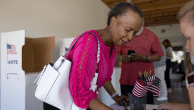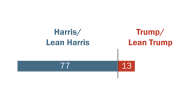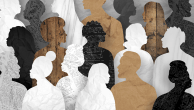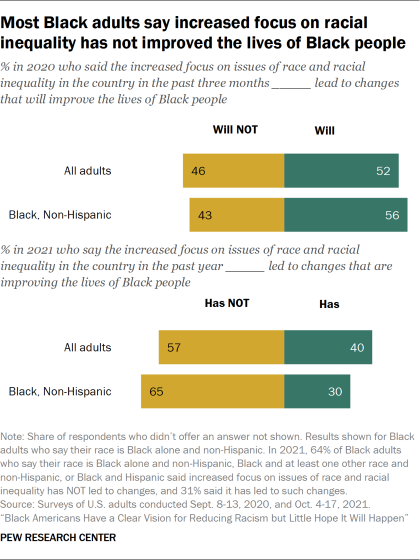
During the national reckoning sparked by George Floyd’s murder in 2020, a significant share of Black Americans expected the increased focus on issues of racial inequality to lead to changes that would improve the lives of Black people. Roughly a year and a half later, nearly two-thirds (64%) of all Black adults, including those who are multiracial or Hispanic, say the increased attention did not lead to such changes, and few (13%) expect Black people will achieve equality in the United States, according to the October 2021 survey.
Instead, Black adults cite racism as a top issue for Black people living in the U.S. today (82%), and most say racial discrimination (68%) is the main reason why many Black people can’t get ahead these days. Yet while the overwhelming majority (79%) of Black adults say they have personally experienced discrimination because of their race or ethnicity, they are also more likely to say racism in our laws is a bigger problem than to cite racism by individual people (52% vs. 43%).
Black Americans see little improvement in their lives despite increased national attention to racial issues
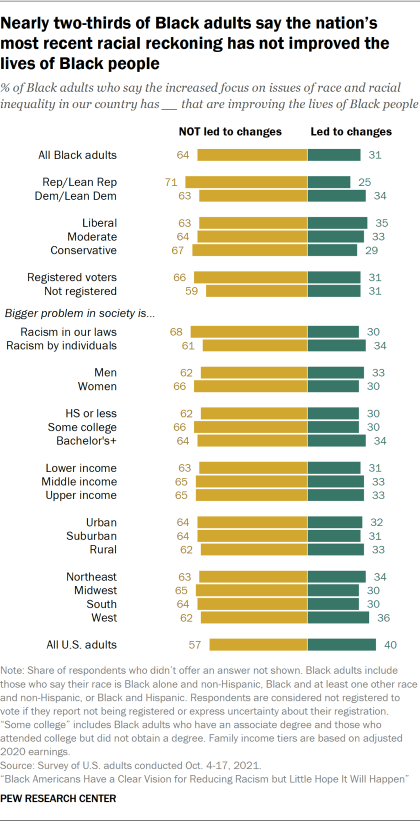
More than a year after national demonstrations following the murder of George Floyd and the subsequent racial reckoning, 64% of Black Americans say the increased focus on issues of race and racial inequality in our country has not led to changes that are improving the lives of Black people. These findings vary little, with majorities of Black adults across demographic subgroups holding this view. Even so, some subgroups are more likely than others to say such changes have not occurred.
Roughly seven-in-ten Black adults who identify with or lean toward the Republican Party (71%) say the increased focus on race and racial inequality has not led to changes that are improving the lives of Black people, compared with 63% of Black Democrats and Democratic leaners who say the same.
Meanwhile, there is little variation across the ideological spectrum, with nearly two-thirds of Black adults who describe their political views as liberal (63%), moderate (64%) and conservative (67%) all saying this.
Similar shares of Black men (62%) and Black women (66%) say the increased focus on racial inequality has not led to changes. Likewise, there are no significant differences by educational attainment or income levels, with majorities of Black adults across education groups and income tiers all agreeing that the increased focus on race has not led to any changes.
When it comes to ethnicity, non-Hispanic Black adults (65%) are slightly more likely than Black Hispanic adults (51%) to say the increased attention has not improved the lives of Black people, while Black multiracial adults are about as likely as both groups to say this (56%).
Black adults who say being Black is extremely or very important to them (66%) are not much more likely than those for whom being Black is less important (58%) to say this. There are no significant differences on this measure by age, with majorities of Black adults across age groups saying the racial reckoning has not led to changes.
Black adults born in the United States (65%) are not much more likely than those born abroad (55%) to say changes have not occurred despite the national reckoning on race.
While majorities of Black adults across a variety of demographic subgroups say the nation’s racial reckoning has not improved the lives of Black people, a smaller share of U.S. adults overall (57%) say the same. Instead, Black adults in the U.S. are less likely than U.S. adults overall to say that the increased focus on race and racial issues has led to changes that are improving the lives of Black people (31% vs. 40%).
Few Black adults expect equality for Black people in the U.S.
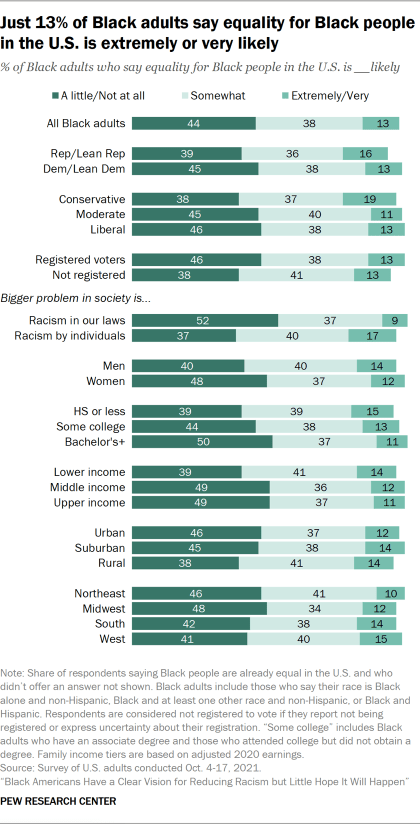
Only a small minority of Black adults (13%) say achieving equality for Black people in the U.S. is extremely or very likely. Instead, nearly four-in-ten say equality is somewhat likely (38%) while 44% say equality is only a little or not at all likely. These findings are consistent across most demographic subgroups of Black Americans, though there is some notable variation.
A larger share of Black Democrats (45%) than Black Republicans (39%) say equality for Black people in the U.S. is only a little or not at all likely. Among both groups, few say it is extremely or very likely equality for Black people will be achieved – 13% and 16% respectively.
While roughly four-in-ten Black conservatives (38%) say equality for Black people is only a little or not at all likely, nearly half of Black moderates (45%) and Black liberals (46%) agree. Likewise, nearly half (46%) of Black registered voters say this, compared with roughly four-in-ten Black adults who are not registered to vote and say the same (38%).
Black adults who say racism in our laws is a bigger problem for Black Americans than racism by individual people (52%) are more likely than those who say racism by individuals is the bigger problem (37%) to believe equality is unlikely for Black people in the United States.
Along gender lines, Black women are more likely than Black men to say equality is a little or not at all likely for Black people in the U.S. (48% vs. 40%).
Black adults with a bachelor’s degree (50%) are more likely than those with some college experience but no four-year degree (44%) or those with a high school diploma or less (39%) to say this. Likewise, Black adults with middle and upper incomes (49% each) are more likely than those with lower incomes (39%) to say equality for Black people in the United States is either a little or not at all likely.
Similar shares of non-Hispanic Black adults (44%), Black multiracial adults (37%) and Black Hispanic adults (38%) say equality is a little or not at all likely for Black people in the U.S.
When accounting for the importance of racial identity, nearly half (47%) of those who say being Black is extremely or very important to them say equality is unlikely, compared with about one-third (34%) of those for whom being Black is less important. Notably, both groups are just as likely to say achieving equality for Black Americans is extremely or very likely – 13% each.
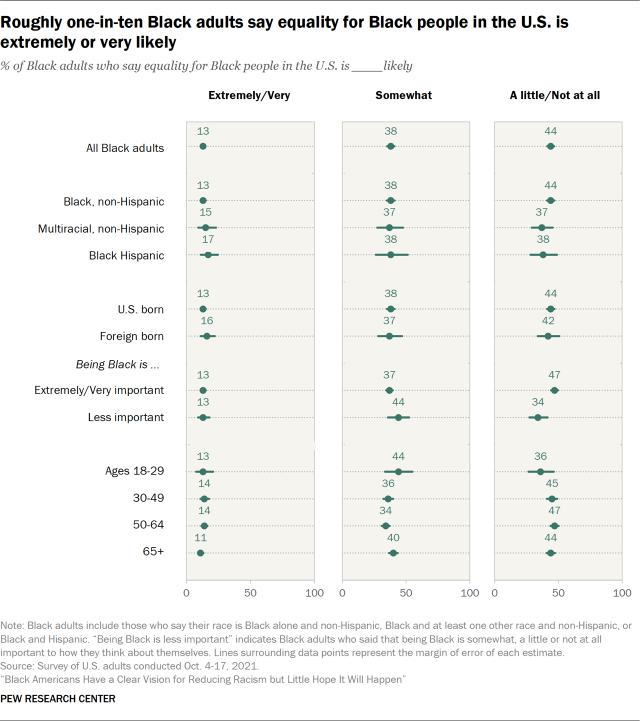
Black adults say racism and police brutality are extremely big problems for Black people in the U.S.
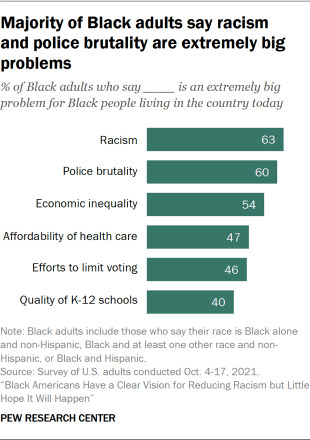
The new survey asked Black adults to rate how much of a problem each of the following issues are for Black people living in the U.S. today: racism, efforts to limit voting, economic inequality, quality of K-12 schools, police brutality and the affordability of health care. While the majority of Black adults say all of these issues are extremely or very big problems, racism and police brutality rank highest.
About six-in-ten Black adults say racism (63%) and police brutality (60%) are extremely big problems for Black people living in the country today. While assessments vary, majorities across many of the subgroups rate both as extremely big problems.
Black Democrats are more likely than Black Republicans to rate each of these issues as an extremely big problem. Roughly two-thirds of Black Democrats say racism (67%) and police brutality (65%) are extremely big problems. By contrast, nearly half of Black Republicans say the same (46% and 44%, respectively).
About seven-in-ten Black liberals say racism (71%) and police brutality (69%) are extremely big problems. Shares drop to roughly six-in-ten (63% and 61%) among Black moderates, and roughly half (55% and 53%) among Black conservatives on both issues.
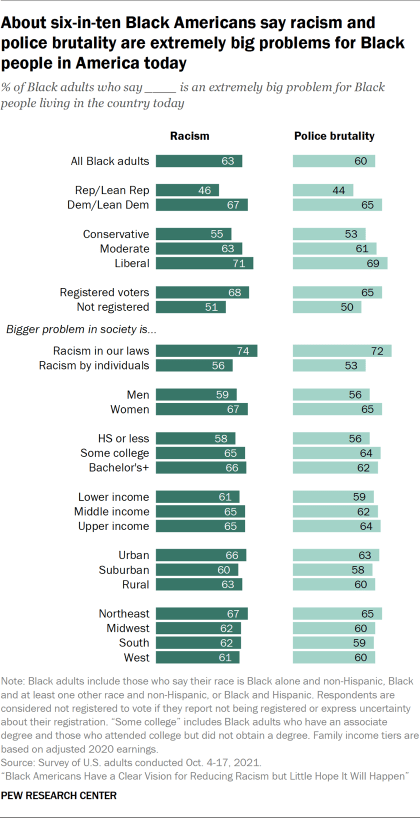
Black registered voters are more likely (68%) than those who are not registered to vote (51%) to say racism is an extremely big problem for Black people in the U.S. Likewise, nearly two-thirds of Black registered voters (65%) say police brutality is an extremely big problem, compared with half of Black adults who are not registered to vote who say the same.
While majorities of both groups say racism and police brutality are extremely big problems, Black women are more likely to say this than Black men. For example, 65% of Black women say police brutality is an extremely big problem for Black people living in the country today, while 56% of Black men say the same.
Notably, there are few significant differences among Black Americans by income level, urbanicity or across regions of the country.
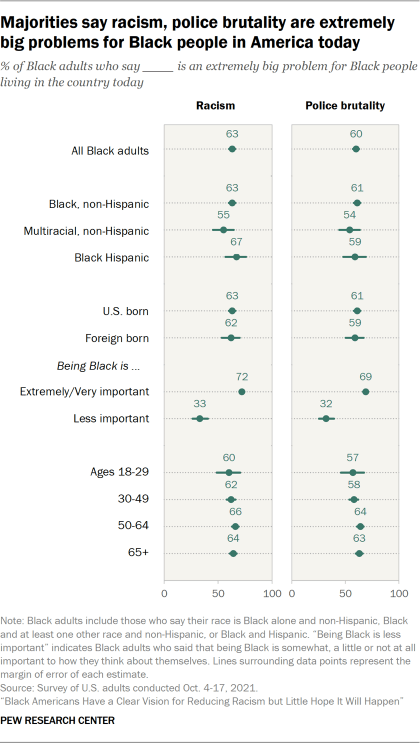
When it comes to ethnicity, roughly six-in-ten non-Hispanic Black adults say racism (63%) and police brutality (61%) are extremely big problems for Black people in the United States. By comparison, roughly half of Black multiracial adults say racism (55%) and police brutality (54%) are extremely big problems. Meanwhile, nearly seven-in-ten (67%) Black Hispanic adults say racism is an extremely big problem, and 59% say the same for police brutality.
Black adults who say being Black is extremely or very important to how they think of themselves (72%) are more likely than those for whom being Black is less important (33%) to say racism is an extremely big problem. Likewise, 72% of Black adults who say being Black is extremely or very important to them also say police brutality is an extremely big problem. By comparison, 32% of Black adults for whom being Black is less important say the same.
Fewer see other national issues, such as economic inequality or K-12 education, as extremely big problems for Black Americans
Smaller shares of Black adults see economic inequality (54%), affordability of health care (47%), efforts to limit voting (46%) and quality of K-12 schools (40%) as extremely big problems for Black people in the U.S. today.
Black Democrats are more likely than Black Republicans to say some of these issues are extremely big problems for Black people in America today. For example, Black Democrats (58%) are more likely than Black Republicans (42%) to say economic inequality is an extremely big problem. Black Democrats (51%) are also more likely than Black Republicans (24%) to say efforts to limit voting are an extremely big problem for Black people living in the country today.
Registered voters are more likely than those who are not registered to vote to see some of these national issues as being extremely big problems for Black people. While nearly six-in-ten Black registered voters (59%) say economic inequality is an extremely big problem, roughly four-in-ten Black adults who are not registered to vote (41%) say the same.
Black adults who believe racism in our laws is a bigger problem than racism by individual people are more likely to see each of these national issues as an extremely big problem for Black people living in the country today. Roughly six-in-ten Black adults who say racism in our laws is a bigger problem (59%) also say efforts to limit voting are an extremely big problem. By comparison, roughly one-third (36%) of Black adults who believe racism by individuals is a bigger problem say this.
Smaller shares of Black adults with lower incomes cite economic inequality, health care affordability, efforts to limit voting and the quality of K-12 schools as extremely big issues compared with those with middle or upper incomes. While 51% of Black adults with lower incomes say economic inequality is an extremely big problem, roughly six-in-ten Black adults with middle incomes (56%) and upper incomes (60%) say the same. And about four-in-ten Black adults with lower incomes (38%) say efforts to limit voting are an extremely big problem, compared with roughly half (53%) of those with middle incomes and nearly six-in-ten (58%) with upper incomes.
A similar pattern exists among education groups. Smaller shares of those with a high school diploma or less education say various national issues are extremely big problems compared with those with higher levels of educational attainment. For example, 45% of Black adults with a high school education or less say economic inequality is an extremely big problem. By contrast, 59% each of those with some college education but no bachelor’s degree and those with at least a bachelor’s degree say the same. Likewise, about one-third (32%) of Black adults with a high school education or less say the quality of K-12 schools is an extremely big problem, compared with roughly four-in-ten of those with some college but no bachelor’s degree (43%) and just under half (46%) of Black adults with a four-year degree or higher.
When it comes to ethnicity, similar shares of non-Hispanic Black adults (54%), Black multiracial adults (46%) and Black Hispanic adults (52%) say economic inequality is an extremely big problem for Black people living in the country today. However, non-Hispanic Black adults (47%) are more likely than Black multiracial adults (35%) to say affordability of health care is an extremely big problem. Additionally, non-Hispanic Black adults (47%) are slightly more likely than Black Hispanic adults (35%) to say efforts to limit voting are an extremely big problem. Roughly four-in-ten Black multiracial adults say this as well (39%).
Overall, Black adults who say being Black is extremely or very important to them are generally more likely than Black adults for whom being Black is less important to say these national issues are extremely big problems for Black people living in the country today. For example, roughly half of Black adults who say being Black is extremely or very important also say affordability of health care (52%) or efforts to limit voting (53%) are extremely big problems. By contrast, a smaller share of Black adults for whom being Black is less important say the same (29% and 23%, respectively).
Similar shares of Black adults across age groups say economic inequality, affordability of health care and quality of K-12 schools are extremely big problems for Black people living in the country today. However, Black adults ages 65 and older (61%) are the most likely age group to say efforts to limit voting are an extremely big problem. This share drops to roughly half (52%) among Black adults ages 50 to 64, roughly four-in-ten (42%) among those 30 to 49 and about one-third (32%) among those 18 to 29.
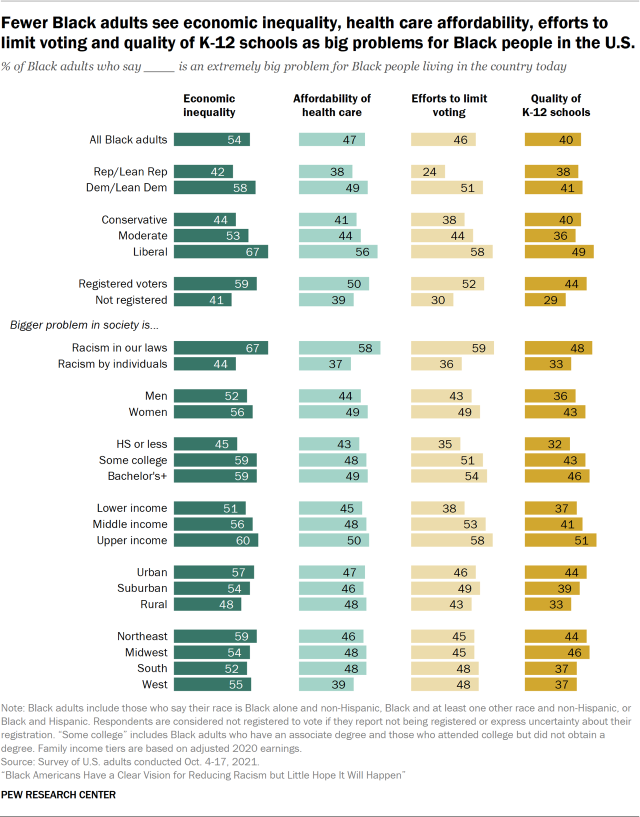
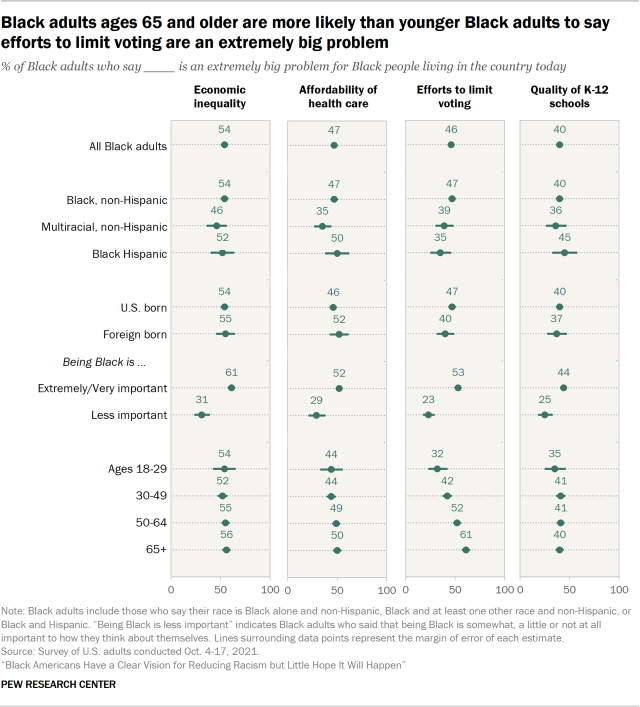
Personal experiences with discrimination are widespread among Black Americans
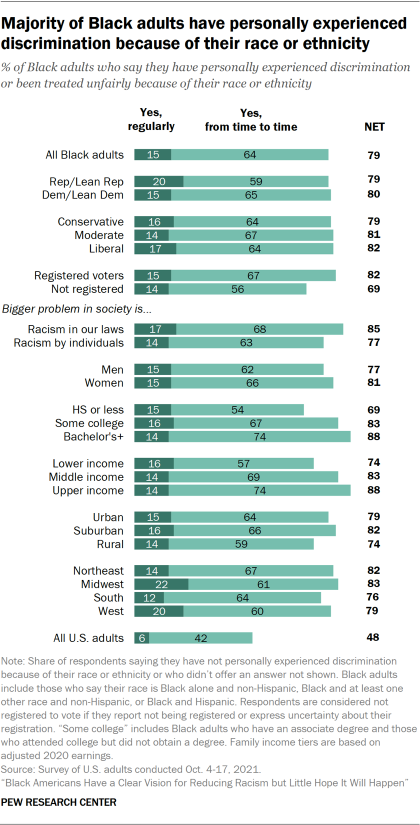
Nearly eight-in-ten Black adults (79%) say they have personally experienced discrimination or been treated unfairly either regularly or from time to time because of their race or ethnicity. These findings vary little, with majorities of Black adults across all demographic subgroups saying this.
There are no significant differences by partisanship on this measure, with similar shares of Black Republicans (79%) and Black Democrats (80%) saying they have personally experienced discrimination or been treated unfairly. Likewise, there’s little variation across the ideological spectrum, with similar shares of Black liberals (82%), Black moderates (81%) and Black conservatives (79%) saying the same.
Roughly eight-in-ten Black registered voters (82%) say they’ve personally experienced discrimination. This share drops to 69% among Black adults who are not registered to vote.
There are no significant differences by gender on this measure, with roughly equal shares of Black men (77%) and Black women (81%) saying they’ve personally experienced discrimination because of their race or ethnicity.
When it comes to education, nearly seven-in-ten Black adults with a high school diploma or less education say they’ve experienced discrimination regularly or from time to time. This share increases to 83% among those with some college experience but no bachelor’s degree and 88% among those with a bachelor’s degree or higher.
Similarly, about three-quarters (74%) of Black adults with lower incomes say they’ve experienced discrimination or been treated unfairly because of their race or ethnicity. This share increases to 83% among those with middle incomes and 88% among those with upper incomes.
Similar shares of non-Hispanic Black adults (79%), Black multiracial adults (81%) and Black Hispanic adults (80%) say they’ve personally experienced discrimination or unfair treatment because of their race or ethnicity. And Black adults who say being Black is extremely or very important to them are more likely (84%) than those for whom being Black is less important (65%) to say the same.
Among age groups, Black adults 65 and older are most likely to say they’ve personally experienced discrimination or unfair treatment because of their race or ethnicity: 85% in this age group say this has happened to them regularly or from time to time. By comparison, roughly seven-in-ten Black adults ages 18 to 29 (73%) and nearly eight-in-ten of those 30 to 49 (77%) and 50 to 64 (81%) say they have experienced discrimination at least from time to time.
While majorities of Black adults across demographic subgroups say they have personally experienced discrimination or been treated unfairly because of their race or ethnicity, fewer than half (48%) of U.S. adults overall say the same.
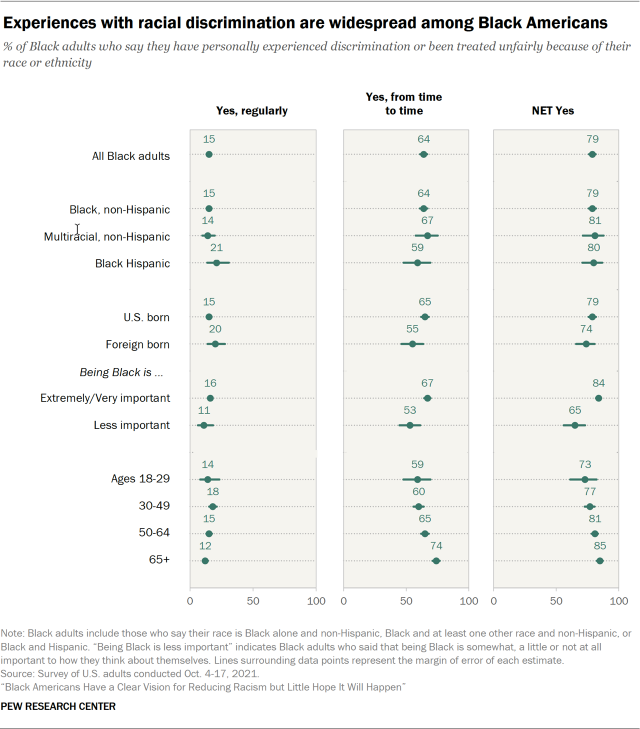
Black adults say racism in our laws is a bigger problem than racism by individual people
Although the majority of Black adults say they have personally experienced discrimination or been treated unfairly because of their race or ethnicity, Black adults are still more likely to say racism in our laws is a bigger problem (52%) than racism by individual people (43%).
Black Democrats are more likely to say racism in our laws is the bigger problem (56%) than racism by individual people (41%). By contrast, about one-third (34%) of Black Republicans say racism in our laws is the bigger problem while more than half (59%) say it is racism by individual people that matters more when it comes to racism against Black people.
Black liberals (59%) are more likely than Black conservatives (42%) to say racism in our laws is the bigger problem, while Black moderates are about as likely (53%) as Black liberals to say this. By contrast, roughly half of Black conservatives (52%) say racism by individual people is the bigger problem, compared with roughly four-in-ten Black moderates (44%) and Black liberals (38%) who say the same.
Black registered voters (55%) are more likely than Black adults who are not registered to vote (44%) to say racism in our laws is the bigger problem, while similar shares of both groups (42% and 45%, respectively) say racism by individual people is the bigger problem.
Among Black adults, the share saying racism in our laws is the bigger problem is higher among those with more education and higher incomes. Black adults with at least a bachelor’s degree (61%) are more likely than those with some college education but no bachelor’s degree (53%) or a high school education or less (44%) to say racism in our laws is the bigger problem. Instead, Black adults with a high school education or less (47%) are more likely than those with at least a four-year degree (37%) to say racism by individual people is the bigger problem.
Likewise, Black adults with lower incomes are the least likely to say racism in our laws is the bigger problem (46%), compared with about six-in-ten with middle (56%) and upper incomes (61%) who say the same. Instead, 46% of Black adults with lower incomes say racism by individuals is the bigger problem, while 41% with middle incomes and 36% with upper incomes say this.
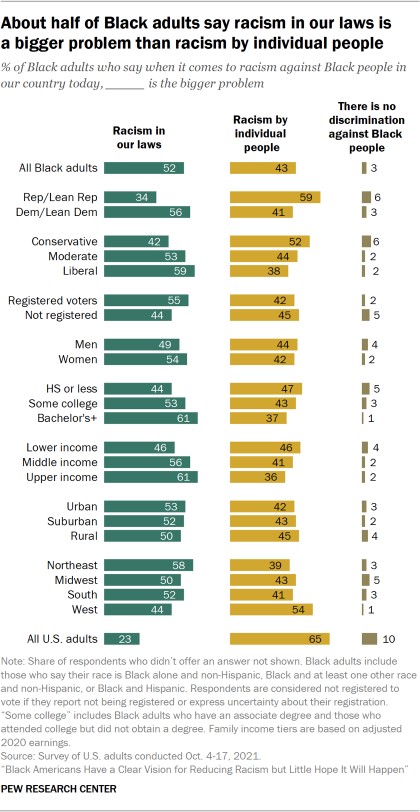
Among Black adults, there is little variation across ethnic groups when it comes to determining which form of racism is a bigger problem for Black people living in the United States. Roughly half of non-Hispanic Black adults (52%) and Black Hispanic adults (49%) say racism in our laws is the bigger problem. Meanwhile, 44% of Black multiracial adults say the same.
Black adults who say being Black is extremely or very important to them (58%) are more likely than those for whom being Black is less important (33%) to say racism in our laws is the bigger problem when it comes to racism against Black people today.
By contrast, those for whom being Black is less important (53%) are more likely than those who say being Black is extremely or very important to them (40%) to say racism by individual people is the bigger problem.
Notably, 10% of Black adults for whom being Black is less important say there is no discrimination against Black people, compared with only 1% of those for whom being Black is extremely or very important.
Roughly four-in-ten Black adults ages 18 to 29 (42%) say racism in our laws is the bigger problem, compared with about half of Black adults ages 30 to 49 (54%) and 50 to 64 (52%). Nearly six-in-ten Black adults 65 and older (58%) agree that racism in our laws is the bigger problem. On the other hand, nearly half (47%) of Black adults ages 18 to 29 say racism by individuals is the bigger problem, compared with roughly four-in-ten Black adults ages 30 to 39 (42%), 50 to 64 (43%) and 65 and older (40%).
Notably, Black adults (52%) are significantly more likely than U.S. adults overall (23%) to say racism in our laws is a bigger problem than racism by individuals when it comes to racism against Black people in the U.S. today. While fewer than half (43%) of Black adults say racism by individual people is the bigger problem, nearly two-thirds (65%) of U.S. adults overall say the same.
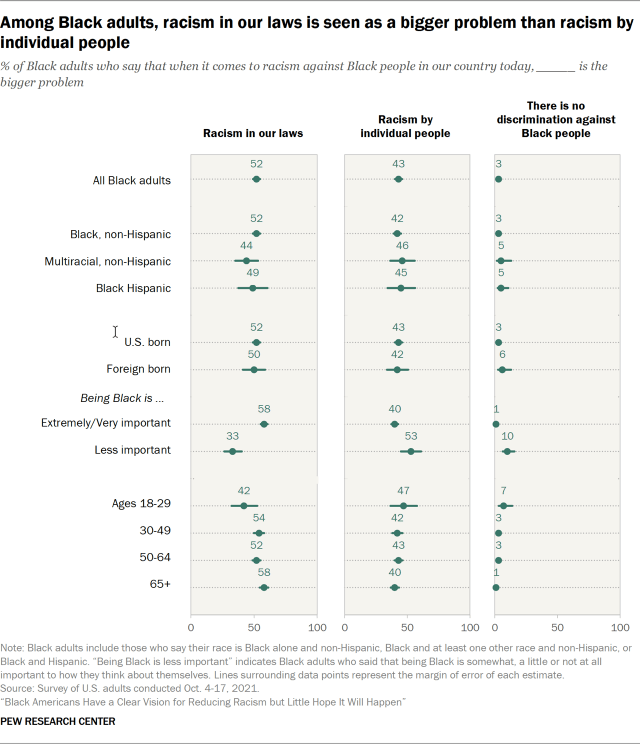
Black adults see racial discrimination as the primary obstacle to success for Black people in America
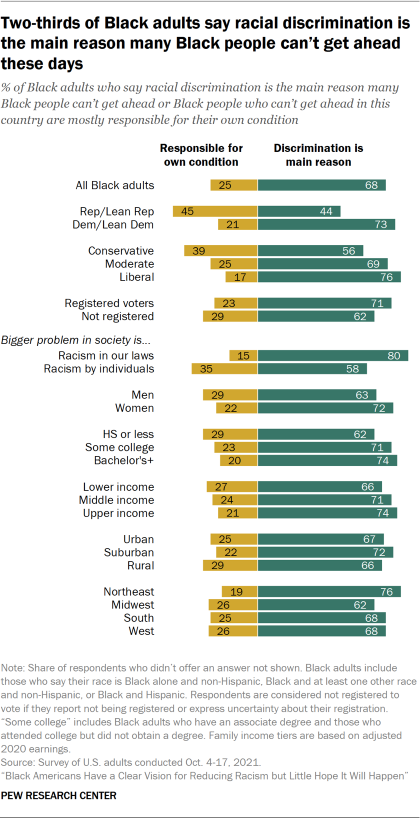
More than two-thirds of Black adults (68%) say racial discrimination is the main reason many Black people can’t get ahead these days, while one-quarter say Black people who can’t get ahead are mostly responsible for their own condition. This finding is unchanged from 2020, when 70% of Black adults cited discrimination as the primary obstacle to success for Black people and 26% said Black people are mostly responsible for their own condition.
According to the new survey, Black Democrats (73%) are far more likely than Black Republicans (44%) to say racial discrimination is the main reason Black people in the U.S. can’t get ahead. Notably, Black Republicans (45%) are more likely than most other demographic subgroups to say Black people who can’t get ahead in the U.S. are mostly responsible for their own condition. Just 21% of Black Democrats hold the same view.
Roughly three-quarters (76%) of Black liberals say racial discrimination is the main reason Black people can’t get ahead, compared with 69% of Black moderates and 56% of Black conservatives. While nearly four-in-ten Black conservatives (39%) say Black people who can’t get ahead are mostly responsible for their own condition, smaller shares of Black moderates (25%) and Black liberals (17%) say the same.
About seven-in-ten Black registered voters (71%) say discrimination is the primary obstacle for Black people in the U.S., while roughly two-in-ten (23%) say Black people who can’t get ahead are mostly responsible for their own condition. Black adults who are not registered to vote are similarly divided on this measure, with roughly six-in-ten (62%) saying discrimination is the main reason Black people can’t get ahead and about three-in-ten (29%) saying those who can’t get ahead are responsible for their own condition.
Black women are more likely (72%) than Black men (63%) to cite racial discrimination as the primary obstacle to getting ahead. Meanwhile, Black men (29%) are more likely than Black women (22%) to say Black people who can’t get ahead are mostly responsible for their own condition.
When it comes to education, about six-in-ten (62%) Black adults with a high school education or less say racial discrimination is the main reason many Black people can’t get ahead. By comparison, 71% of those with some college but no bachelor’s degree and 74% of those with at least a bachelor’s degree say the same. Likewise, Black adults with middle and upper incomes (71% and 74%, respectively) are more likely than Black adults with lower incomes (66%) to point to racial discrimination as the main reason many Black people can’t get ahead these days.
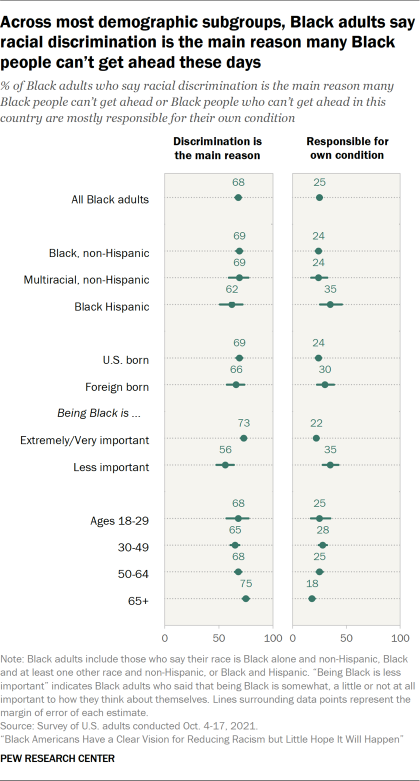
Nearly seven-in-ten non-Hispanic Black adults and Black multiracial adults (69% each) say racial discrimination is the main reason Black people can’t get ahead, a view shared by 62% of Black Hispanic adults. Among Black adults who say being Black is extremely or very important to them, 73% say racial discrimination is the main reason Black people can’t get ahead. This share decreases to 56% among those who say being Black is less important.
These findings are fairly consistent across most age groups, though three-quarters of Black adults 65 and older say racial discrimination is the main reason many Black people can’t get ahead, while about two-thirds of Black adults ages 18 to 29 (68%), 30 to 49 (65%) and 50 to 64 (68%) say the same. By comparison, roughly one-quarter of Black adults under 65 say Black adults who can’t get ahead are mostly responsible for their own condition. Just 18% of Black adults 65 and older say the same.


